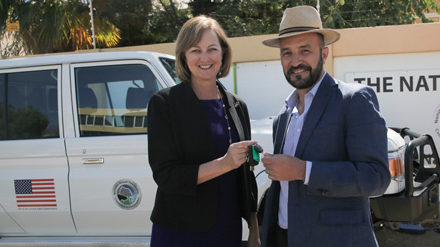
Anti-poaching drive beefed up with introduction of Rhino Management plans and horse patrols

The anti-poaching drive was strengthened with the recent launch of two Rhino Management plans and a horse patrol unit last week at the Etosha National Park on Friday.
Speaking at the commemoration of World Rhino Day, the Minister of Environment, Forestry and Tourism (MEFT), Pohamba Shifeta said the day is dedicated to raising awareness about the threats that the rhino population is facing and how the world can come together and protect these endangered species.
“Illegal hunting for rhino horn is primarily responsible for the crash in black rhino numbers in Africa from perhaps 100,000 animals in the 1960s to a low of about 2,410 in 1995. Through strict conservation programs, the numbers in Africa have since increased, reaching 5,081 by the end of 2012,” he noted.
According to Shifeta, the Rhino Management Plans will serve as a tool and help conserve and sustainably manage a growing free-ranging population of both black and white rhinos within Namibia.
“Our target is to have a population of black rhinos that continues to show a positive growth trend, sustainably utilized, contributing to the species conservation costs and improved livelihoods. Our population of white rhinos within protected areas should also grow, and we should have a healthy metapopulation of privately owned white rhinos freehold land, sustainably utilized for economic return,” he said.
Shifeta said using horses in the conservation and protection of rhinos will help with mounted patrols and cover more distances.
“Thirteen horses have been purchased by the MEFT with funding support from the Game Product Trust Fund. Eight horses will have their duty station in Etosha National Park, while five will be stationed in Waterberg Plateau Park,” he added.
Shifeta meanwhile said Namibia still experiences illegal hunting of rhinos as well as illegal trade in rhino horns.
The greatest threat to the rhino population is illegal hunting, he said, adding that this year, 39 rhinos have been poached in Namibia, compared to 92 in 2022, 50 in 2021, 47 in 2020, and 61 in 2019.
The event was attended by MEFT officials, Namibia Defense Forces, Namibia Police Force, representatives from Save The Rhino Trust and WWF Namibia as well as representatives from conservancies.













































